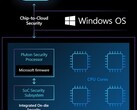AMD now touts its fresh Ryzen PRO 4000 series as "the new standard for modern business PCs". This may be due to its new flagship, which upgrades to a 7-series variant - the PRO 4750G - in 2020. It is joined by the 5 4650G and 3 4350G in this new line-up.
The 7 PRO 4750G is also a potential revolution for this section in that it doubles the core and thread count of its counterpart the 5 PRO 3400G, as well as its cache size. In fact, even the 3 4350G now has the same 4 cores and 8 threads of this 2019 corporate flagship, although it still has 6MB of cache. The middle 5 4650G child steps up to 11MB of cache and a 6/12 core/thread conformation.
These processors run at 3.6-4.4GHz, 3.7-4.2GHz and 3.8-4.0GHz respectively. Nevertheless, they retain the 65W TDP of their predecessors. Accordingly, the OEM estimates that the 4750G can beat Intel's Core i7-9700 with vPro by up to 31% in terms of speed. In addition, AMD claims a power efficiency boost of up to 43% (in terms of performance-per-watt) compared to non-7nm platforms.
On that note, it may also reduce the impact on a corporate power bill by about 8% (which may help explain the decision on TDP). AMD also expects they will run quieter and cooler too; all these potential advantages are of course attributed to their Zen 2 nature.
These business-focused processors also naturally pack the OEM's PRO Technologies, which are intended to rival Intel's vPro offerings: for example, PRO Security may replace vPro Security while PRO Manageability is Active Management Technology's (AMT) counterpart.
They are also equipped with AMD's "multi-layered" Memory Guard encryption solution for "most modern" data-retention. Therefore, this new Ryzen PRO 4000 series seems a compelling option for those company fleet completion or upgrade plans. Then again, their maker has yet to mention a form beside the pre-made PC in their supply, or OEMs besides Lenovo and HP to date.
On a more positive note, dedicated GPUs may be an option during configuration. Furthermore, the machines that run on these processors may be able to look forward to up to 18 months' worth of software support from AMD. The chipmaker also currently plans to keep their supply going for no less than 24 months, which may assuage a lot of purchaser anxiety at the IT department.
At what may be the opposite end of the new Renoir release spectrum, we have been told the new Athlon 3000 G-series APUs are left on Zen+ cores. Nevertheless, they boast Radeon graphics, as well as 4 cores and threads, whereas comparable Pentium Gold G5xxx chipsets have 2 cores apiece and are lucky if they double that in threads. Then again, the Athlon Gold 3150G flagship is clocked at 3.9GHz, same as the G5600.
However, the newer prospect, along with its siblings the 3150GE (3.8GHz) and 3050GE (3.4GHz), get a 6MB cache whereas their Intel counterparts are stuck at 4. They can also say they get a PRO-grade TDP - it is indeed 65W - whereas the Pentium or Celerons against which they are now pitched have 54W.
Source(s)
AMD Press Release















